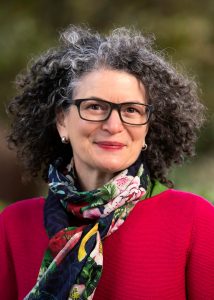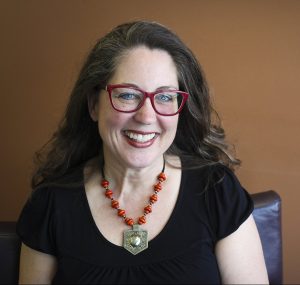In
News
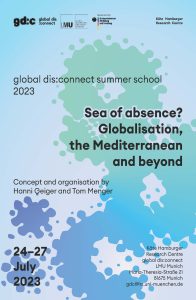 Concept and organisation by Hanni Geiger and Tom Menger, Käte Hamburger Research Centre global dis:connect, LMU, Munich.
Concept and organisation by Hanni Geiger and Tom Menger, Käte Hamburger Research Centre global dis:connect, LMU, Munich.
Presenters include Florian Bachmeier and Eckehard Pistrick, Constance de Gourcy, Celeste Ianniciello and Renata Poljak. Participants are also invited to attend an evening lecture by Eva Mayer and Eran Schaerf taking place at the centre on 26 July.
Sea of absence? Globalisation, the Mediterranean and beyond
Munich, 24-27 July 2023
The
global dis:connect Research Centre invites
MA, doctoral students and creative professionals in all stages of their careers to meet in Munich for a summer school on the absences produced by globalisation processes, focusing on
the Mediterranean, particularly on the aspects of
migration, tourism and (post)coloniality, in the past, present and future.
Like globalisation research generally, some of the most famous scholarship on the Mediterranean Sea has focused on the different connections that bind the ‘Middle Sea’ together (Braudel, 1949; Horden & Purcell, 2000). Its connections, however, have also created and obfuscated many absences: of people, of cultural belonging, of institutions, of personal and collective memories, of regions, of (art) objects, in archives, epistemologies, discourses, in stories and representations of and about the Mediterranean, and finally in our scholarship.
The summer school aims to combine subjects such as art history, history, social sciences, media and film studies, theatre studies, literary and cultural studies with artistic approaches. It will allow the participants to present their own projects and will feature several master classes by renowned scholars, as well as art and film presentations. All sessions will be held in English.
global dis:connect promotes
dialogue between scholarship and art as equal means to approach dis:connective phenomena of globalisation. Such phenomena leave few traces in archives and defy direct observation, but artistic practice can reveal them. Recent years have seen increased attention to the global Mediterranean and its absences, particularly in art, film, theatre, design and architecture.
Dissertation projects, grant proposals, exhibition projects and artistic interventions are all welcome. Participants can propose whatever format best suits their work, be it a traditional presentation, a film screening, an artistic intervention, a moderated discussion or a slide show. The
deadline for applications is
15 May 2023.
There are no participation fees. The Centre
will cover accommodation and travel costs for all participants.
Absences, globalisation and the Mediterranean
Starting from the concept of absences, including voids, erasures, exclusions and disappearances, the summer school will focus mainly on three distinct manifestations of absences in the Mediterranean: migration, tourism and (post-)coloniality.
Absences are not simply ‘absent’ and therefore invisible. Rather, as Derrida noted, they leave ‘traces’. Recent work has expanded on this notion and has even argued that absences can have spatiality, materiality and agency (M. Meyer & Woodthorpe, 2008). They are objects of research in addition to a perspective; they necessitate their own methodologies, combining different disciplines, theories and practices. The arts have proven particularly fruitful in illuminating absences, finding ways to visualise the repressed and the excluded, drawing attention to individual destinies and disappearances and addressing cultural belonging in connection with absences.
Many of the absences of today’s Mediterranean are inextricably linked to globalising processes. This is more than evident in the fact that many migrants crossing the sea (or dying in the attempt) are not from those shores, but from Sub-Saharan Africa, Iran, Bangladesh and further afield. Therefore, it is unsurprising that Mediterranean absences have been addressed in the context of
migration recently (CRISALIDE, 2017). This research has re-emphasised Abdelmalek Sayad’s notion of ‘double absence’ in the Mediterranean migrant experience (particularly of migrant labourers from Algeria). As conditions have changed in recent decades, this notion has been largely superseded by a ‘double presence’ (Saada, 2000). However, as Constance de Gourcy has shown, absence continues to be relevant and even constitutive of relations between origins and destinations (Gourcy, 2018a, 2018b). Of particular interest are Mediterranean borders, border regimes and the absences they create, like those that become visible in the Lampedusian project
Porto-M, a project collecting the objects lost, washed ashore or abandoned by those migrating across the sea (Askavusa, 2009).
Migration in the Mediterranean has always been entangled with
tourism since the 19
th century — a second lens through which to view absences in the Mediterranean. The Mediterranean as an idyllic vacation destination, where tourists can contemplate the origins of Western civilisation as reified in its archaeological ruins, swim in the turquoise sea and enjoy the benefits of the Mediterranean diet, has overwritten other conceptions of the region and marginalised many groups and areas (Terranova & Chambers, 2021).
Apart from migration and tourism,
(post)coloniality would provide a third lens to think through Mediterranean absences. Colonialism in the Mediterranean basin generated many absences for scholarship and art to address, such as settler-colonial processes of erasure (for instance, in colonial Algeria) and the dominance of colonial epistemologies that privilege the Mediterranean’s northern, European shore (Chambers & Cariello, 2019). Modern artists, such as Alessandra Cianelli and Beatrice Ferrara, have responded to these absences by opening a (post)colonial archive of Italy with subtle, personal works (Ferrara et al., 2014). Furthermore, links have also been drawn between the Mediterranean and the ‘Black Atlantic’, both as seas of dispossession and unbelonging, with biopolitical power over black and brown bodies today being replicated on the Mediterranean frontiers of the European Union (Terranova & Chambers, 2021).
The notion of ‘absences’ has always played a prominent role in postcolonial thought. Léopold Senghor, for instance, mused on absence and global Black (in)visibility in his poem
L’absente, while for Édouard Glissant and Frantz Fanon, the Mediterranean was either a reference point or a lived historical experience (Glissant, 1997, p. 33; Proglio et al., 2021). The summer school is an opportunity to consider the conceptual links among postcolonial thought, absence and the Mediterranean.
Absences have also affected cultural belonging throughout the region, either forming a basis of group identity (as for the Sephardi Jews) or as the result of nation-states’ attempts to conceal more cosmopolitan social realities, such as that of Levantinism in the eastern Mediterranean (Yehoshúa, n.d.; E. Meyer & Schaerf, 2022). The various invisibilities induced by advancing nationalism in the region are made manifest, for example, through digital techniques of erasure in film by Kamal Aljafari (Grunebaum, 2021).
Beyond Mediterranean absences in past and present, the summer school is equally interested in exploring Mediterranean
futures. What futures can be (re)imagined for a region affected by ongoing financial crises, mass migration and climate change?
We would like to stress that we conceive of the Mediterranean as broadly as possible and welcome proposals that go beyond the sea itself. Starting from the perspective of absences, possible topics for the summer school include:
- absent regions, agents, artefacts, institutions, discourses, theories and perspectives in/on the Mediterranean
- Mediterranean epistemologies/narratives, histories and the ‘unlearning’ of the Mediterranean (Chambers) through the lens of absences
- methodologies (artistic or scholarly) to explore Mediterranean absences
- the agencies, spatialities and materialities of absences
- invisible or hidden routes of migrations or borders
- lost, abolished or vanished objects and actors
- (mass) tourism and what it hides or removes
- colonial erasures
- postcolonial thinking on absences and their (im)possible overcoming
- absences and personal/collective affects and memories
- the (hegemonically curated) construction and concealment/disappearance/exclusion of Mediterranean cultural belongings and groups
- imagining Mediterranean futures through an engagement with absences (materially and ideologically/theoretically)
Global dis:connect is a research centre dedicated to exploring historical and contemporary globalisation processes. We’ve conceived the summer school to overcome disciplinary disconnections and bring together different subjects, approaches and geographies.
To apply, please send the following documents by 15 May:
- A CV (max. one page).
- A cover letter of no more than one page explaining your motivation.
- A description of what you intend to present at the summer school (0.5-2 pages). Proposals for artistic presentations can include images, links to videos, film stills and other media.
Please send us your application as a single PDF file by email to: Hanni.Geiger[a]lmu.de and T.Menger[a]lmu.de.
Please click
HERE to download the Poster.
Continue Reading
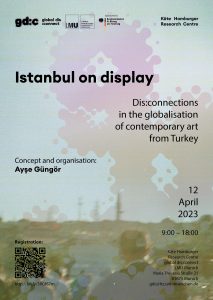 On 12 April 2023, the Centre will hold a workshop centring on the representation of Istanbul in Germany through several exhibitions since 2000.
On 12 April 2023, the Centre will hold a workshop centring on the representation of Istanbul in Germany through several exhibitions since 2000.





 Concept and organisation by Hanni Geiger and Tom Menger, Käte Hamburger Research Centre global dis:connect, LMU, Munich.
Presenters include Florian Bachmeier and Eckehard Pistrick, Constance de Gourcy, Celeste Ianniciello and Renata Poljak. Participants are also invited to attend an evening lecture by Eva Mayer and Eran Schaerf taking place at the centre on 26 July.
Concept and organisation by Hanni Geiger and Tom Menger, Käte Hamburger Research Centre global dis:connect, LMU, Munich.
Presenters include Florian Bachmeier and Eckehard Pistrick, Constance de Gourcy, Celeste Ianniciello and Renata Poljak. Participants are also invited to attend an evening lecture by Eva Mayer and Eran Schaerf taking place at the centre on 26 July.
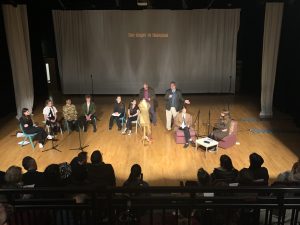 Kevin Ostoyich spoke in Edinburgh, Scotland following the Scottish Premiere of The Singer of Shanghai on 31 January 2023. Ostoyich co-wrote the play with Prof. Kari-Anne Innes and the students of the course, Historical Theatre: The Shanghai Jews at Valparaiso University.
The play narrates the true story of the Abraham family as they fled from Germany after Kristallnacht and found a haven in Shanghai, China. The play was performed in Edinburgh by students of Broughton High School. The event was sponsored by the Edinburgh Interfaith Association; the Edinburgh Jewish Cultural Centre; and Adam and Kyeon-ah Leven and Family.
Ostoyich is currently working on two more plays titled Three Girls of Shanghai and Three Boys of Shanghai. Ostoyich hopes the plays will be performed at schools around the world in order to spread awareness about the history of the Shanghai Jews. If you or anyone you know is interested in performing any of these plays, please contact Ostoyich at
Kevin Ostoyich spoke in Edinburgh, Scotland following the Scottish Premiere of The Singer of Shanghai on 31 January 2023. Ostoyich co-wrote the play with Prof. Kari-Anne Innes and the students of the course, Historical Theatre: The Shanghai Jews at Valparaiso University.
The play narrates the true story of the Abraham family as they fled from Germany after Kristallnacht and found a haven in Shanghai, China. The play was performed in Edinburgh by students of Broughton High School. The event was sponsored by the Edinburgh Interfaith Association; the Edinburgh Jewish Cultural Centre; and Adam and Kyeon-ah Leven and Family.
Ostoyich is currently working on two more plays titled Three Girls of Shanghai and Three Boys of Shanghai. Ostoyich hopes the plays will be performed at schools around the world in order to spread awareness about the history of the Shanghai Jews. If you or anyone you know is interested in performing any of these plays, please contact Ostoyich at 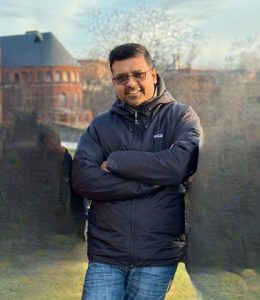 A warm welcome to our new guest Arnab Dey who joins global dis:connect in early February.
Currently an associate professor of history at the State University of New York at Binghamton, Arnab is a historian of modern India and the British Empire, with research interests centred around questions of law, labour and the environment. Arnab’s first monograph, Tea Environments and Plantation Culture looked at the monoculture tea enterprise of British east India. This study brought the plant and the plantation together in analysing the praxis and politics of commodity capitalism. His associated research agendas and publications have similarly involved tracing imperial capital, legal regimes and environmental transformations in the British colonial world and the Indian subcontinent.
A warm welcome to our new guest Arnab Dey who joins global dis:connect in early February.
Currently an associate professor of history at the State University of New York at Binghamton, Arnab is a historian of modern India and the British Empire, with research interests centred around questions of law, labour and the environment. Arnab’s first monograph, Tea Environments and Plantation Culture looked at the monoculture tea enterprise of British east India. This study brought the plant and the plantation together in analysing the praxis and politics of commodity capitalism. His associated research agendas and publications have similarly involved tracing imperial capital, legal regimes and environmental transformations in the British colonial world and the Indian subcontinent. 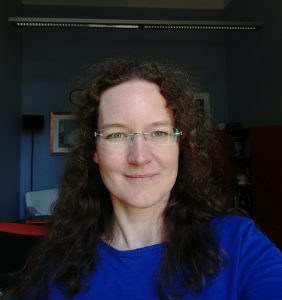 A warm welcome to our new guest Katharina Wilkens who joins global dis:connect in early February.
A warm welcome to our new guest Katharina Wilkens who joins global dis:connect in early February.
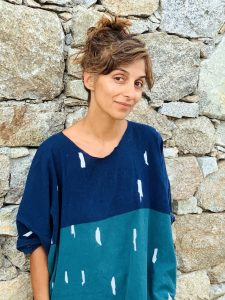
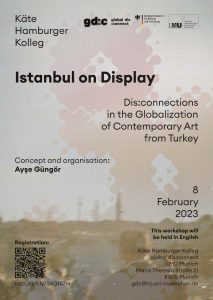 On 8 February 2023, the Centre will hold a workshop centring on the representation of Istanbul in Germany through several exhibitions since 2000.
The global curatorial and artistic narratives about artists from Turkey have resulted in several critiques of European representational strategies that are predominately centred on geographical, cultural and national identities. In consequence, an increasing number of critical artistic and curatorial practices have emerged that attempt to transcend and challenge the art world's reductionist, Eurocentric tendencies, such as casting doubt on conventional stereotypes of East vs. West and the construction of 'Other'.
With global connectedness and disconnectedness as framing concepts, this workshop aims to explore the tensions that emerge from this dichotomy and how they relate to representations of Istanbul through several exhibitions in Germany since 2000. By exploring this context as a complex relationship of global interconnectivity, it aims to identify gaps, limitations and tensions in the globalisation processes of contemporary art from Turkey by considering the politics of art and exhibition politics in Europe.
This workshop's main objective is to contribute to a decolonial discussion on the globalization of contemporary art from Turkey by focusing on exhibition strategies and artistic forms of resistance. This involves sharing knowledge to understand globalisation and its intricate structures from a variety of perspectives. The workshop is a forum for debate and dialogue, bringing together scholars, artists, and curators to further develop this research and share from their own areas of expertise.
Where and when: Munich, 8 February 2023, 9.00 - 18.30
Language: English
Venue: Käte Hamburger Research Centre global dis:connect,
On 8 February 2023, the Centre will hold a workshop centring on the representation of Istanbul in Germany through several exhibitions since 2000.
The global curatorial and artistic narratives about artists from Turkey have resulted in several critiques of European representational strategies that are predominately centred on geographical, cultural and national identities. In consequence, an increasing number of critical artistic and curatorial practices have emerged that attempt to transcend and challenge the art world's reductionist, Eurocentric tendencies, such as casting doubt on conventional stereotypes of East vs. West and the construction of 'Other'.
With global connectedness and disconnectedness as framing concepts, this workshop aims to explore the tensions that emerge from this dichotomy and how they relate to representations of Istanbul through several exhibitions in Germany since 2000. By exploring this context as a complex relationship of global interconnectivity, it aims to identify gaps, limitations and tensions in the globalisation processes of contemporary art from Turkey by considering the politics of art and exhibition politics in Europe.
This workshop's main objective is to contribute to a decolonial discussion on the globalization of contemporary art from Turkey by focusing on exhibition strategies and artistic forms of resistance. This involves sharing knowledge to understand globalisation and its intricate structures from a variety of perspectives. The workshop is a forum for debate and dialogue, bringing together scholars, artists, and curators to further develop this research and share from their own areas of expertise.
Where and when: Munich, 8 February 2023, 9.00 - 18.30
Language: English
Venue: Käte Hamburger Research Centre global dis:connect, 